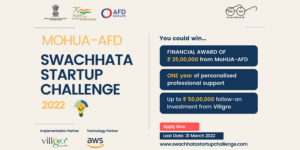If you read this site often, you’d think the startup life is all about successes, funding rounds and expansion. The reality is that within the first five years of existence, half of the startups have failed. Within ten years, that number is up to 90 per cent. What happens with those many, many businesses? That’s what researcher Sarah Herzog wanted to know. She presented her findings last week during the Breaking the Ice event in Amsterdam.
Breaking the ice about failing a business
Herzog started to look into what happens to failed businesses after her PhD in entrepreneurial ecosystems. She found that most ecosystem reports all talked about the same thing: accelerators, access to VC money, support systems for growth. None of those mentioned anything about what would inevitably happen to a large part of startups that were supported. Failing, as it seemed, was often not an option. And if it happened, entrepreneurs were left for themselves.
Get to know the amazing finalists here
That is also what Herzog found out after researching failed startups in The Netherlands, for StartupAmsterdam. She spoke with 50 entrepreneurs and key stakeholders who personally experienced a failed business. And indeed, once your startup is not doing too well, support seems to dry up quickly.
‘You need a girlfriend’
“There is no proper support system”, says Herzog. “The government and the Chamber of Commerce (KvK) are eager to tell you how to start a business, but not how to wind it down. There’s hardly any information out there on how to file for bankruptcy, except for some lawyers that put it on their website to drive traffic.”
In fact, Herzog found the Dutch support system for startups that go belly up seem to revolve largely around one type of person. “You need to get a girlfriend before you fail”, Herzog says, partly joking. “For the many founders I spoke to, their girlfriends were their support system. On rare occasions it was the team, sometimes old classmates from University. But not the ecosystem stakeholders.”
VC, accelerators, government unhelpful
“Commercial support organisations like investors generally don’t have a lot of time. And founders found that if they do help once a business goes down, it is already too late. Once it is obvious a venture is closing down, VCs and angels are not interested in helping it to wind down.” Herzog found that only some ventures that had some money left in their pockets to repay investors could count on help. “Some investors pushed entrepreneurs to just continue what they were doing, driving them to burn out.”
Accelerators, which are aplenty in Amsterdam, are also not very helpful when it comes to failing. Herzog: “Their batches are often so big, they can’t focus on their previous batches.” On top of that, the law is also not in favour of entrepreneurs that filed for bankruptcy. Herzog: “This sometimes makes starting up hard again. I spoke with two founders who couldn’t file for visas once they started new businesses. This meant they weren’t able to hire foreign talent.”
There are some small bright spots, Herzog noticed. “Some accelerators have knowledge sessions with failed entrepreneurs, so peers can learn from their experiences. And some investors facilitate the sharing of experiences.” But all in all, it’s too little according to Herzog.
‘Dutch don’t talk about failures’
So what gives? Why is there so little support for something that happens so often? Part of it is cultural, thinks Herzog. “In the USA, failing is more common and openly talked about. Some investors don’t talk to you if you haven’t failed a project first.” Failing is part of the startup life, as long as you do it fast and cheap. That’s different in The Netherlands. “Dutch don’t brag too much, but they also don’t talk about what they don’t achieve.”
“From a young age, we’re being taught that failure is bad. Schools hardly teach that failing is not the end of the world. And the media also doesn’t help”, says Herzog. Sites such as this one mostly shine a spotlight on funding rounds and success stories. “You don’t talk about failure a lot, this doesn’t help to normalise it.”
Where are the women?
That might also be a reason Herzog struggled to identify founders that failed and who wanted to share their experiences with her. She’s still looking for people to finalise her research project. Strangely enough, the entrepreneurs she did find were all male. “I’ve interviewed only one woman so far.” There are some different theories as to why failed female founders are a rare sight. One is that females don’t fail. “But more realistically, it might be because it is more difficult for women to prove themselves as an entrepreneur. So admitting failure also hurts them more.”
Some founders are more inclined to speak openly about their failures. Four of them even joined the stage during Breaking the Ice for a panel discussion. TNWs Boris Veldhuijzen van Zanten moderated the discussion and was joined by HelloMentor’s Quincy Dalh, B.Amsterdams Ricardo van Loenen and Roger Olivieira, who bills himself as an ‘expert in recovery after failure’ on his LinkedIn. All panellists agreed that they were lucky to live in The Netherlands, where ‘rock bottom still means you don’t have to starve’. But they also acknowledged a bankruptcy takes its toll, both professionally and personally, and getting help is hard.
‘I felt lost’
Dalh says it is easy to frame failing a business as ‘the best MBA you can get.’ “But you only say that afterwards. During the process, I really felt lost.” Olivieira shared his own lessons on stage. “The most important thing is to put someone neutral in between.” A friend advised him to do so when he headed for bankruptcy. He ended up with multiple creditors. “When you owe people money, they get very emotional. When dealing with someone neutral, the anger will go away and you can start looking for creative solutions for the problem.”
It’s exactly that kind of lesson that is shared too little, leaving failing entrepreneurs to find their own way out. Herzog sees value in this experience for the ecosystem and wants to motivate those entrepreneurs to step back into the game. “We need those failed founders to join startups that need that entrepreneurial expertise. It’s important to match those people as mentors to other founders.”
Building a safety net
Secondly, she says there needs to be more government support, for instance by providing more information on what to do. Herzog also proposes an online graveyard of ideas, a database of startups that didn’t make it and their reasons why. But first and foremost, there should be a cultural shift. “Founders are reluctant to talk about their failures because they don’t want to get stigmatised. But those who did found it really positive. It’s mostly in their heads. You just need to know how to communicate and what to communicate to make the most of it.”
Herzog is looking to finish her research this year but is still looking for founders willing to share their experiences. After these first findings, presented at Breaking the Ice, she’s talking to the economic board of Amsterdam, to identify the most urgent needs and look for funding to establish a safety net for startups going south.
How partnering up with Salesforce helped him succeed!









